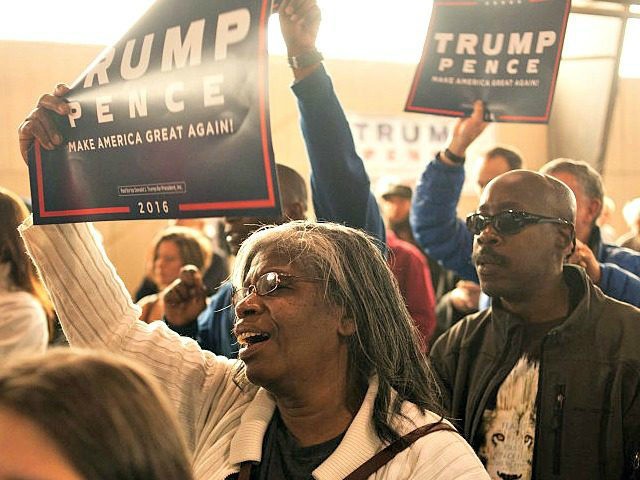Two influential and very establishment writers are debunking the criticisms that left-wingers enjoy throwing at former President Donald Trump.
Trump did not win the 2016 election because of rising racism, admitted Thomas Edsall, a New York Times columnist who normally zigs-zags between criticizing populists while also admitting that establishment economic policies have been harmful to most Americans.
I've seen two articles on recent electoral trends this week. Both worth reading, but I'd like to add a sidebar:
Our ability to measure electoral trends has degraded significantly over the last few years.https://t.co/v3H6kKe3Xv https://t.co/ofzTCQxcPP— Nate Cohn (@Nate_Cohn) March 22, 2023
Under the March 22 headline, “The Unsettling Truth About Trump’s First Great Victory,” Edsall describes the new evidence about Trump’s shocking win in the 2016 election:
Trumpism has found fertile ground across a broad swath of the electorate, including many firmly in the [non-racist] mainstream. That Trump could capture the hearts and minds of these [non-racist] voters suggests that whatever he represents beyond racial resentment — anger, chaos, nihilism, hostility — is more powerful than many recognize or acknowledge. Restoring American politics to an even keel will be far tougher than many of us realize.
The New York Times‘ admission is late. Trump entered the primaries in 2015, and Democrats have been blaming his win on supposedly racist voters for seven years.
Over at the Washington Post, Charles Lane wrote on March 22 that Trump has had a deep — and sometimes positive — impact on American politics:
Indicted or unindicted, elected president again or not, Donald Trump has been one of the most divisive, destabilizing figures in U.S. political history and, equally undeniably, one of the most influential.
Amid D.C.’s ongoing conflicts over migration, race, sex, and foreign policy, Lane writes:
It’s rarely explicit or even acknowledged. Those who look for [consensus], though, can find bipartisan overlap across key global and domestic policy issues. And this de facto agreement bears the imprint of Trump’s eight years at the center of U.S. politics.
…
The nationalist, populist agenda Trump imposed on an internationalist and business-friendly GOP has interacted with an analogous left-populist drift among Democrats, transforming economic and foreign policy debate in both parties. This transformation seems likely to last through the next presidential election and beyond.
For example, Trump’s policy towards China “has helped marginalize a business lobby, formerly strong in both parties, that favored economic engagement with Beijing,” said Lane.
Trump junked the Trans-Pacific Partnership trade with Asian countries, and “the Biden administration has maintained the same policy of presidentially directed trade war — with acquiescence from both sides of the aisle,” Lane said.
US imports of some Chinese products have tanked. Others are higher than ever. How Trump’s selective use of tariffs continues to matter for the question about US-China decoupling.
My new look at the data 1/ https://t.co/44H6DluBV9
— Chad P. Bown (@ChadBown) October 20, 2022
The grudging compliments come as progressives zigzag between fear of Trump and his primary opponent, Florida Gov. Ron DeSantis, who offers himself as a more competent, less divisive champion of Trump’s populist policies.
The articles also spotlight establishment worry that Democrats will lose the election to Trump or DeSantis by refusing to recognize populist economic concerns. The Democrats’ eagerness to blame racism for their 2016 defeat is “too comforting, fostering the belief that Trump’s triumph was [only] the product of voters who have drifted far from the American mainstream,” said Edsall.
Also, the two articles ignore Trump’s core 2016 campaign plank — his promise to change the establishment’s wealth-shifting policy of mass migration by legal and illegal routes.
MSNBC’s Psaki: DeSantis Can’t Beat Trump as the ‘Culture War Hero’
Trump largely ignored his immigration promises for two years and also filled many White House jobs with pro-migration, tax-cutting establishment advocates. Only in 2019 and 2020 did Trump successfully force down illegal immigration and begin to trim legal immigration. His implementation of lower-migration policies successfully forced up wages in 2020 and 2021, but because he did not change the law, President Joe Biden has been able to flood the labor and housing markets with six million new migrants.
DeSantis is now pushing a series of migration-cutting laws through the Florida legislature. That push sets him up for a primary debate with Trump about who can best force a pro-American shift in the nation’s wealth-shifting immigration laws.
The federal government has long operated an unpopular economic policy of Extraction Migration. This colonialism-like policy extracts vast amounts of human resources from needy countries, reduces beneficial trade, and uses the imported workers, renters, and consumers to grow Wall Street and the economy.
The migrant inflow has successfully forced down Americans’ wages and also boosted rents and housing prices. The inflow has also pushed many native-born Americans out of careers in a wide variety of business sectors and contributed to the rising death rate of poor Americans.
The lethal policy also sucks jobs and wealth from heartland states by subsidizing coastal investors with a flood of low-wage workers, high-occupancy renters, and government-aided consumers. The population inflow also reduces the political clout of native-born Americans, because it allows elites to divorce themselves from the needs and interests of ordinary Americans.
A 54 percent majority of Americans say Biden is allowing a southern border invasion, according to an August 2022 poll commissioned by the left-of-center National Public Radio (NPR). The 54 percent “Invasion” majority included 76 percent of Republicans, 46 percent of independents, and even 40 percent of Democrats.

COMMENTS
Please let us know if you're having issues with commenting.